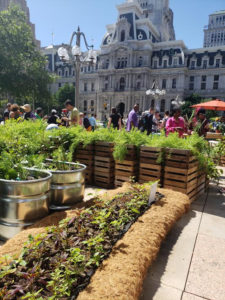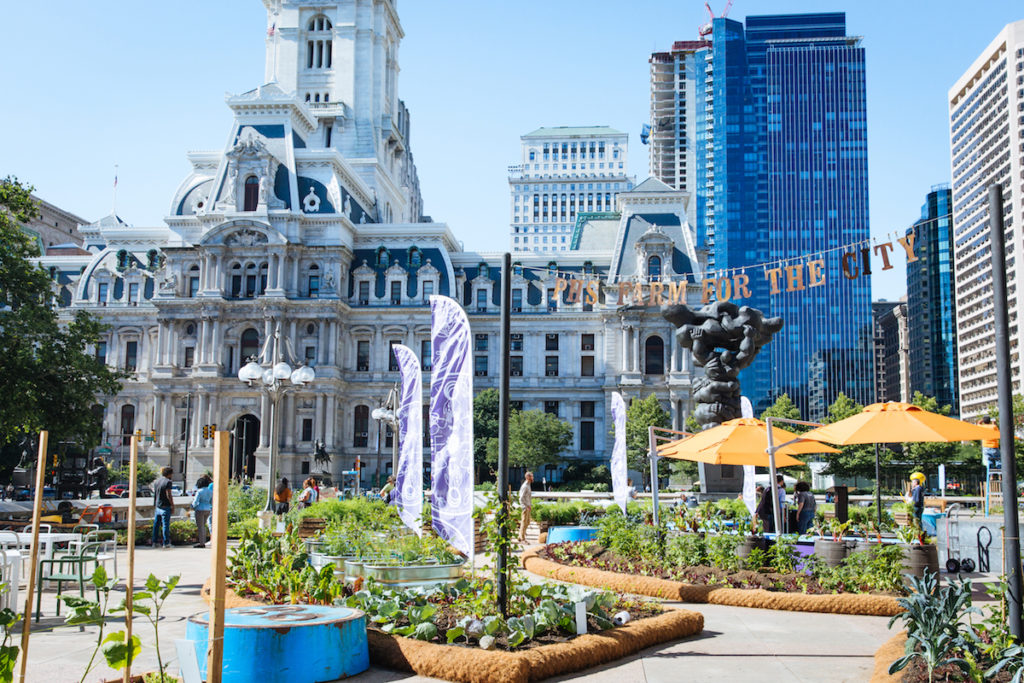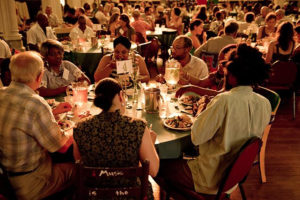Farm for the City: Growing an urban garden near City Hall to fight food insecurity
 July 24, 2018
Category: Feature, Featured, Long, Results
July 24, 2018
Category: Feature, Featured, Long, Results
Motivated to highlight food insecurity and the necessity of community gardens, the Pennsylvania Horticultural Society (PHS) and Broad Street Ministry (BSM) partnered and were awarded a $300,000 grant from the Pew Center for Arts & Heritage last year.
The grant money went toward installing and operating Farm for the City, an urban garden filled with about a dozen fruits, vegetables and herbs, located a few steps away from City Hall on top of Thomas Paine Plaza.
“We thought that if we plopped down a farm right in the middle of Center City it would help shine a light on all the amazing work of community gardeners in strengthening neighborhoods,” said Julianne Schrader Ortega, VP and chief of programs at PHS.
PHS and BSM are both involved in work to support community gardens and formerly incarcerated Philadelphians.
“Partnering with us, they were able to kind of bring in our expertise around food insecurity and what we’re doing to address homelessness and deep poverty within the city limits,” said Theresa Malandra, senior director of development and marketing at BSM.
The produce from the farm is all donated to BSM’s social services program, which provides people experiencing homelessness and poverty with meals, personal care items, clothing, mail services, mental health and primary medical care services and more. The program serves lunch Monday through Friday from noon to 1 p.m.
The farm will be open until Sept. 29, and the goal is to donate 1,000 pounds of produce. Schrader Ortega said over 350 pounds of produce have been donated so far.
Before the farm opened in June, ingredients for BSM’s meals were bought locally and donated by Carversville Farm, a nonprofit in Bucks County that grows fresh produce to give to food-insecure populations.
The addition of the produce from the temporary farm has given the kitchen team at BSM more food to experiment with.
“For our kitchen team to be able to have different types of produce and the fact we get big crates or a big delivery of one specific thing,” Malandra said. “Our chefs are able to be like, ‘Well how many different ways can we use beets this week?’ They’ve been able to flex their creative muscle.”
Most importantly, determining the selection of produce for the farm was partly up to the people BSM serves. PHS surveyed guests of BSM to see what kinds of greens, veggies and fruits they wanted to see incorporated into their meals.
PHS “didn’t want to just dictate what we would get,” Malandra said. “They really wanted to hear the voices of the people that we serve.”
The produce was also decided by speaking to PHS City Harvest, a group of urban growers who work with families experiencing poverty. The farm now includes African eggplant, chard, carrots, cilantro, fennel, lavender, mint, onion and thyme.
In addition to the beds of crops growing on the plaza, Charlyn Griffith, program curator for the farm, put together workshops and events for people who wander into the farm to understand the deeper issues behind the farm.
“Talking about how you can start your own garden in your back door or with your community, so that you’re able to get fresh produce on your own and not be reliant on a supermarket,” said Malandra, about the farm’s programming. “We have a lot of food deserts in Philadelphia, and they’re really trying to shine the light on food access and how people can have their own food sovereignty.”
The themes of the programs are soil, seed, plant and harvest. The programming is currently focused on seed, which covers techniques and stories of the African Diaspora.
The team of farmers who grow the crops and engage with people passing by have also been helping with the programs. Schrader Ortega said the farmers educate people about crops, food access and the role of community gardens.
“It’s a key part of our city’s infrastructure — these community gardens,” Schrader Ortega said. “There’s not really enough resources to support all the gardeners and, right now with development pressures in the city, there’s a lot of challenges with land access for gardeners, too.”
Griffith and the farmers have also been helping out with BSM’s Summer Youth Initiative. Malandra said groups of middle and high school youth from churches around the country have been participating in programming at the farm to learn about community gardening and justice issues in Philadelphia to bring “radical hospitality” back to their communities.
Some of the people experiencing poverty right next to the farm have been watering plants, interacting with the farmers and participating in the programming as well.
“We really are hoping that putting the Farm for the City right there is a way to interact with all sorts of people,” Schrader Ortega said. “Whether you’re going to pay your water bill or whether you’re experiencing homelessness or whether you’re just passing through on your way to catch a bus, hopefully you’ll be interacting with the farm team.”
To help draw in more supporters, BSM and PHS will be hosting another community dinner focused on community gardeners on Sept. 14 for gardeners, advocates, BSM church partners, city officials and others. The first community dinner on July 13 focused on food insecurity.
“If we’re addressing these issues of poverty, instability and homelessness, and we’re really looking at the solution to them and getting the rest of the community involved in that solution, it’s just going to be better for the city,” Malandra said.
Farm for the City is open Monday to Friday from 8 a.m. to 8 p.m. and Saturday and Sunday from 10 a.m. to 6 p.m.
Project
Broke in PhillyTrending News












